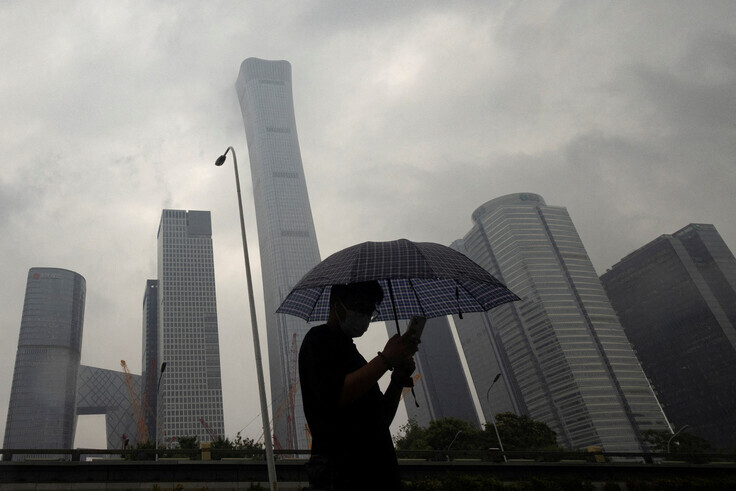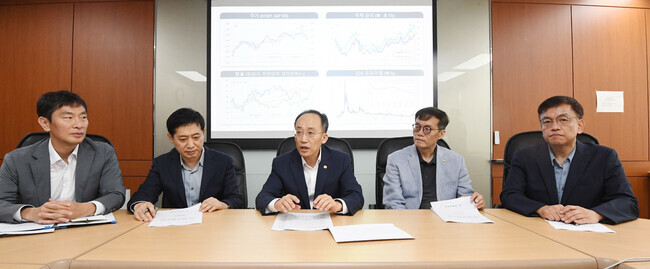hankyoreh
Links to other country sites 다른 나라 사이트 링크
Chinese real estate woes, high US interest rates spell trouble for S. Korea’s economy

“The construction and real estate industries represent around 30% of China’s economy. A steep drop in Chinese demand from a real estate-based economic downturn could cause South Korea’s growth rate to fall by as much as 0.3 percentage points.”
This was the warning shared in a telephone interview with the Hankyoreh on Sunday by a securities company analyst familiar with the situation in China.
This suggests that the South Korean administration is way off base with its position insisting that there is “no need to overreact to speculation about a Chinese real estate crisis” and that the real estate issue is “merely an internal situation for China.”
The analyst said, “Given how much of our exports to China center around intermediate goods, the idea that worsening Chinese investment and consumption won’t have much of a ripple effect on South Korean exports is something out of ancient history.”
The South Korean economy is facing pressure on both sides as the US heats up and China cools rapidly. In China, the real estate situation has led to financial worries and an economic drop-off that are dragging down South Korean exports and the value of the won. Meanwhile, more and more analysts are predicting the US will maintain high interest rates for some time to come.
Perhaps the biggest source of concern is the narrowing scope of Seoul’s room to maneuver with macroeconomic fiscal and monetary policies in response to the worsening external environment.
The won-to-dollar exchange rate has increased by around 30 won (2.5%) based on closing values in the eight trading days since Aug. 7, when the situation erupted in China with the real estate developer Country Garden’s default on its liabilities.
The KOSPI index declined for six straight trading days, finishing at 2,504.5 as of Friday and threatening to drop below 2,500 points.
The Chinese real estate crisis threatens the growth of the South Korean economy, which usually makes up for poor performance early in the year in the final six months, by fueling financial market instability and slowing exports and growth.
If China’s demand for investment and consumption halts, the volume of semiconductors, construction machinery, chemicals, and home appliances it buys from South Korea could also see a sharp decline.
“The fact that Chinese consumption is still sluggish despite two years of pent-up demand after its COVID-19 lockdown was lifted is a serious problem,” commented Kim Yong-beom, the CEO of Hashed Open Research and former vice minister of economy and finance. “There are clear signs of a ‘balance sheet recession,’ in which real estate, the No. 1 investment asset, is in shambles, prompting both households and businesses to tighten their purse strings.”
In other words, real estate deleveraging has cast the shadow of a prolonged recession on the Chinese economy. This is why global investment banks such as JPMorgan Chase and Barclays have repeatedly cut their growth forecasts for China this year to 4%, below the government’s 5% target.

To make matters worse, soaring US interest rates have hit the Korean economy like a ton of bricks. According to data from the Bank of Korea, the 10-year US Treasury bond rate, a benchmark for global market interest rates, has risen vertically by 0.499 percentage points from 3.752% (as of Jan. 3) at the beginning of 2023 to 4.251% on Aug. 18.
“Expectations that the US economy will remain stronger than expected and that inflation won’t back down are reflected in long-term rates,” said Yoon In-koo, a department head at the Korea Center for International Finance.
By raising the cost of financing for companies and households, a surge in interest rates in the global market could lead to sluggish investment and consumption, as well as widening losses for domestic firms with overseas assets.
It could also increase the risk of credit risks by overindebted households and companies. In other words, the US boom threatens the weak link in the Korean economy: low growth and excessive debt.
The ongoing discussion in the US to raise the “neutral rate of interest” — the equilibrium interest rate that keeps inflation constant — also poses burdens for Korea. A move to raise the neutral interest rate would signal that monetary tightening in the US could become more intense and prolonged.
The market is expecting the discussion to take center stage at the upcoming Jackson Hole conference, a gathering of US monetary officials and academic experts, later this week.
Despite the various obstacles beyond Korea’s borders, the government has a narrow range of macro policy options, including monetary and fiscal ones.
First, focusing on monetary policy is difficult with household debt rising and the interest rate gap between South Korea and the US being the largest in history.
Fiscal policy is hampered by a severe revenue hole and the government’s entrenched bent toward austerity. The government plans to keep next year’s budget around 3% higher than this year’s, with no additional spending.
This is not unrelated to the fact that the government is trying to lower external risks.
“The default of Chinese real estate developers is an internal problem of the Chinese real estate market. It is unlikely to escalate into a systemic risk,” a key official at the Ministry of Finance shared. “The decline in South Korea’s exports to China is also not bad in terms of de-risking.”
Ha Joon-kyung, a professor of economics at Hanyang University, said, “A vicious cycle of low growth and rising inequality could emerge as external risks escalate. Changes in fiscal management are needed.”
By Park Jong-o, staff reporter; Ahn Tae-ho, staff reporter
Please direct questions or comments to [english@hani.co.kr]

Editorial・opinion
![[Guest essay] Preventing Korean Peninsula from becoming front line of new cold war [Guest essay] Preventing Korean Peninsula from becoming front line of new cold war](https://flexible.img.hani.co.kr/flexible/normal/500/300/imgdb/original/2024/0507/7217150679227807.jpg) [Guest essay] Preventing Korean Peninsula from becoming front line of new cold war
[Guest essay] Preventing Korean Peninsula from becoming front line of new cold war![[Column] The state is back — but is it in business? [Column] The state is back — but is it in business?](https://flexible.img.hani.co.kr/flexible/normal/500/300/imgdb/original/2024/0506/8217149564092725.jpg) [Column] The state is back — but is it in business?
[Column] The state is back — but is it in business?- [Column] Life on our Trisolaris
- [Editorial] Penalties for airing allegations against Korea’s first lady endanger free press
- [Editorial] Yoon must halt procurement of SM-3 interceptor missiles
- [Guest essay] Maybe Korea’s rapid population decline is an opportunity, not a crisis
- [Column] Can Yoon steer diplomacy with Russia, China back on track?
- [Column] Season 2 of special prosecutor probe may be coming to Korea soon
- [Column] Park Geun-hye déjà vu in Yoon Suk-yeol
- [Editorial] New weight of N. Korea’s nuclear threats makes dialogue all the more urgent
Most viewed articles
- 1Behind-the-times gender change regulations leave trans Koreans in the lurch
- 2South Korean ambassador attends Putin’s inauguration as US and others boycott
- 3Yoon’s revival of civil affairs senior secretary criticized as shield against judicial scrutiny
- 4Family that exposed military cover-up of loved one’s death reflect on Marine’s death
- 5AI is catching up with humans at a ‘shocking’ rate
- 6Yoon’s broken-compass diplomacy is steering Korea into serving US, Japanese interests
- 7[Guest essay] Preventing Korean Peninsula from becoming front line of new cold war
- 8Japan says its directives were aimed at increasing Line’s security, not pushing Naver buyout
- 91 in 10 marriages in Korea last year was with a foreign national
- 10[Column] The nuclear umbrella and the afterlife